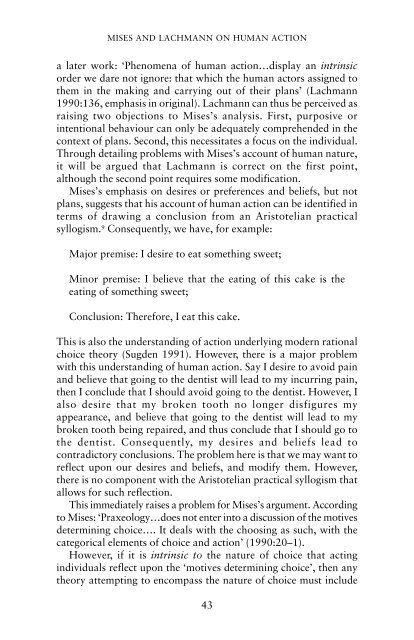Subjectivism and Economic Analysis: Essays in memory of Ludwig ...
Subjectivism and Economic Analysis: Essays in memory of Ludwig ...
Subjectivism and Economic Analysis: Essays in memory of Ludwig ...
You also want an ePaper? Increase the reach of your titles
YUMPU automatically turns print PDFs into web optimized ePapers that Google loves.
MISES AND LACHMANN ON HUMAN ACTIONa later work: ‘Phenomena <strong>of</strong> human action…display an <strong>in</strong>tr<strong>in</strong>sicorder we dare not ignore: that which the human actors assigned tothem <strong>in</strong> the mak<strong>in</strong>g <strong>and</strong> carry<strong>in</strong>g out <strong>of</strong> their plans’ (Lachmann1990:136, emphasis <strong>in</strong> orig<strong>in</strong>al). Lachmann can thus be perceived asrais<strong>in</strong>g two objections to Mises’s analysis. First, purposive or<strong>in</strong>tentional behaviour can only be adequately comprehended <strong>in</strong> thecontext <strong>of</strong> plans. Second, this necessitates a focus on the <strong>in</strong>dividual.Through detail<strong>in</strong>g problems with Mises’s account <strong>of</strong> human nature,it will be argued that Lachmann is correct on the first po<strong>in</strong>t,although the second po<strong>in</strong>t requires some modification.Mises’s emphasis on desires or preferences <strong>and</strong> beliefs, but notplans, suggests that his account <strong>of</strong> human action can be identified <strong>in</strong>terms <strong>of</strong> draw<strong>in</strong>g a conclusion from an Aristotelian practicalsyllogism. 9 Consequently, we have, for example:Major premise: I desire to eat someth<strong>in</strong>g sweet;M<strong>in</strong>or premise: I believe that the eat<strong>in</strong>g <strong>of</strong> this cake is theeat<strong>in</strong>g <strong>of</strong> someth<strong>in</strong>g sweet;Conclusion: Therefore, I eat this cake.This is also the underst<strong>and</strong><strong>in</strong>g <strong>of</strong> action underly<strong>in</strong>g modern rationalchoice theory (Sugden 1991). However, there is a major problemwith this underst<strong>and</strong><strong>in</strong>g <strong>of</strong> human action. Say I desire to avoid pa<strong>in</strong><strong>and</strong> believe that go<strong>in</strong>g to the dentist will lead to my <strong>in</strong>curr<strong>in</strong>g pa<strong>in</strong>,then I conclude that I should avoid go<strong>in</strong>g to the dentist. However, Ialso desire that my broken tooth no longer disfigures myappearance, <strong>and</strong> believe that go<strong>in</strong>g to the dentist will lead to mybroken tooth be<strong>in</strong>g repaired, <strong>and</strong> thus conclude that I should go tothe dentist. Consequently, my desires <strong>and</strong> beliefs lead tocontradictory conclusions. The problem here is that we may want toreflect upon our desires <strong>and</strong> beliefs, <strong>and</strong> modify them. However,there is no component with the Aristotelian practical syllogism thatallows for such reflection.This immediately raises a problem for Mises’s argument. Accord<strong>in</strong>gto Mises: ‘Praxeology…does not enter <strong>in</strong>to a discussion <strong>of</strong> the motivesdeterm<strong>in</strong><strong>in</strong>g choice…. It deals with the choos<strong>in</strong>g as such, with thecategorical elements <strong>of</strong> choice <strong>and</strong> action’ (1990:20–1).However, if it is <strong>in</strong>tr<strong>in</strong>sic to the nature <strong>of</strong> choice that act<strong>in</strong>g<strong>in</strong>dividuals reflect upon the ‘motives determ<strong>in</strong><strong>in</strong>g choice’, then anytheory attempt<strong>in</strong>g to encompass the nature <strong>of</strong> choice must <strong>in</strong>clude43

















